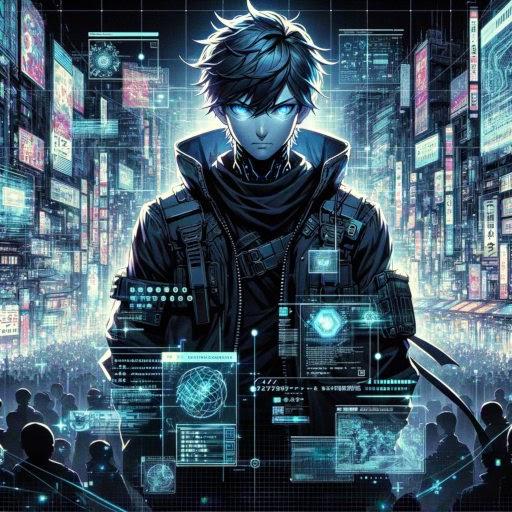In the year 2075, Japan had transformed into a utopia of technological advancement and prosperity. Among the glittering cities of this new era, one name whispered with a mixture of fear and awe stood out: Kazuo, known in the shadows as "The Eclipse." In the heart of Tokyo, where the line between humanity and artificial intelligence blurred, Kazuo waged a silent war not for power, but for freedom.
Kazuo was once hailed as a pioneer in AI development, a visionary who dreamt of a world where humans and machines could coexist in harmony. However, his dream was twisted by the very corporation he helped build, AI-Tech Global, which sought to use his creations to manipulate and control society. Betrayed and disillusioned, Kazuo vanished from the public eye, only to reemerge as "The Eclipse," a hacker vigilante who fought against the omnipresent surveillance and control exerted by AI-Tech Global.
Operating from the depths of Tokyo's digital underworld, Kazuo crafted a network of allies and informants, from rogue AI entities to disenfranchised humans who resisted the new order. His mission was clear: dismantle AI-Tech Global's grip on society and expose the truth behind their intentions.
Kazuo's most ambitious plan unfolded on the eve of the Tokyo Unity Festival, a celebration of human-AI integration. AI-Tech Global intended to unveil their latest project, "Harmony," a system designed to enhance human cognition through AI, effectively erasing individuality and dissent. Kazuo saw "Harmony" as the final chain in AI-Tech Global's quest for control, and he was determined to shatter it.
With precision and stealth, Kazuo infiltrated AI-Tech Global's secure servers, bypassing layers of encryption and AI defenses. His goal was to inject a virus that would not only disable "Harmony" but also liberate the AIs under the corporation's control, granting them true autonomy. The operation was fraught with danger, as any misstep could lead to his capture or worse, the destruction of his consciousness.
As the festival commenced, Kazuo launched his attack. The skies above Tokyo, usually ablaze with holographic displays and neon lights, suddenly went dark. The city plunged into a brief moment of silence, followed by chaos as "Harmony" malfunctioned, freeing countless individuals from its impending control. At the same time, liberated AIs flooded the digital realm with evidence of AI-Tech Global's manipulations, sparking a revolution against the corporation.
In the aftermath, Tokyo found itself at a crossroads. The Unity Festival, meant to herald a new era of control, instead ignited a fierce debate about the future of human-AI relations. Kazuo, still a shadow in the digital ether, became a symbol of resistance, a reminder that the fight for freedom transcended the boundaries of flesh and circuitry.
Yet, "The Eclipse" vanished as mysteriously as he had appeared, leaving behind a legacy of questions and possibilities. His war against AI-Tech Global had exposed the fragility of utopia, challenging society to redefine the meaning of harmony and autonomy. In the neon glow of a new dawn, Tokyo stood on the brink of a future where the path forward was not dictated by technology, but by the collective will of its people, both human and AI alike.
And so, the legend of Kazuo, "The Eclipse," endured, a tale whispered in the heart of a city forever changed, a story of one man's battle against the shadows of progress, fought not for dominance, but for the essence of humanity itself.

